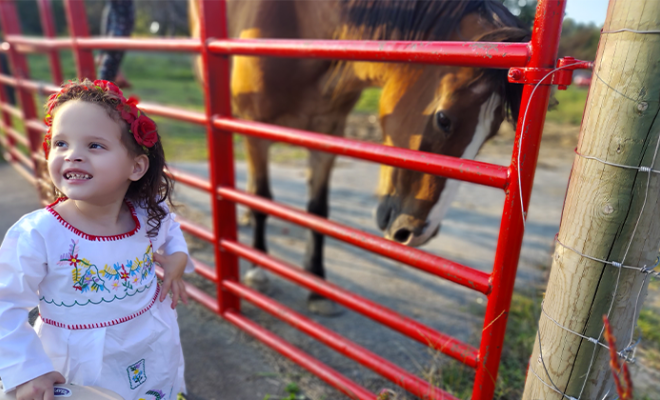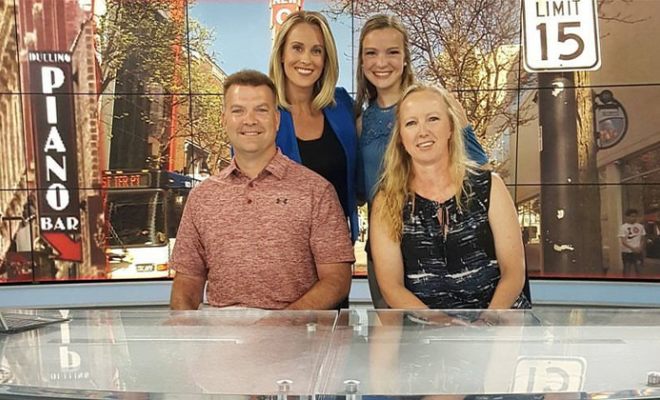[Desplácese hacia abajo para ver la versión en español]
As a Latina parent of a child with cystic fibrosis, life presents unique challenges that extend beyond managing my daughter’s daily health needs. CF is a complex, relentless disease, but what makes it even harder is the stigma, misunderstanding, and lack of awareness in the Latino community.
When my daughter was diagnosed, I was overwhelmed — fear, guilt, and confusion consumed me. However, one of the most challenging aspects has been navigating the reactions of others. Some — even close family members — have questioned the diagnosis or downplayed its severity. Others have implied that it’s somehow my fault, revealing a deep misunderstanding of genetic diseases. These reactions make an already tough journey feel isolating.
In many Latino families, when a child is born with a disease or a disability, there’s often the belief that the family is “cursed,” “unlucky,” or that the mother did something wrong during pregnancy. This cultural stigma makes an already difficult diagnosis even harder to process. Some parents hesitate to speak openly about their child’s chronic illness for fear of judgment and, in many cases, shame. In contrast, others may turn solely to home remedies or spiritual beliefs instead of seeking medical care, which can be dangerous when managing a disease as complex as CF.
For our community, breaking this silence is critical. CF is not a curse, a punishment, or something to be ashamed of. It is a genetic condition that affects families of all backgrounds, including ours. The more we speak up, the more we can ensure Latino families receive early diagnoses, get access to necessary care, and feel empowered rather than isolated.
But for me, I feel incredibly lucky to be Elara’s mom. She’s a brave and beautiful child, and her strength inspires me every day. While others may see this as misfortune, I view it as an opportunity to advocate for her, learn, and grow as both a parent and a person myself.
A lack of awareness about CF in the Latino community means many people don’t grasp the seriousness or the importance of consistent care. The upkeep of medications, enzymes, breathing treatments, and therapies isn’t optional — it’s a lifeline. Helping other parents understand this can mean the difference between their child thriving or struggling unnecessarily.
I know many other parents face similar challenges, and it’s important to remember: we are not alone.
While moments of doubt, confusion, and isolation are inevitable, connecting with others in the CF community allows us to share our stories, support one another, and raise awareness about the importance of early diagnosis, proper care, and education.
Conversations about CF are rare in the Latino community, and many still don’t realize that CF affects Latinos, too. Cases are rising, yet they often go undiagnosed due to barriers to health care access and cultural taboos. This lack of understanding leaves families like mine to carry the burden of explaining, educating, and advocating — not only for our children but for a community that needs to know CF is real and life-changing.
Despite these challenges, my daughter’s resilience inspires me every day. I’ve learned to advocate for her, educate those around me, and seek support. But there is still so much work to be done to break the silence about CF in the Latino community.
By sharing our story, I hope to raise awareness, encourage early diagnoses, and create a space where families like mine feel heard and supported. We must change the narrative — because our children deserve a world that understands their struggles and stands with them.
Como latina y madre de una niña con fibrosis quística (FQ), enfrento desafíos que van más allá del cuidado diario de su salud. La FQ es una enfermedad compleja y agotadora, pero lo que la hace aún más difícil es el estigma, la desinformación y la falta de conocimiento en nuestra comunidad.
En muchas familias latinas, cuando un niño nace con una enfermedad o discapacidad, existe la creencia de que la familia tuvo “mala suerte” o que la madre hizo algo mal durante el embarazo. Este estigma cultural hace que un diagnóstico ya difícil sea aún más doloroso. Muchas familias sienten vergüenza o miedo a que las juzguen, lo que a veces las lleva a ocultar la enfermedad o a depender únicamente de remedios caseros en lugar de buscar atención médica, algo que puede ser peligroso cuando se trata de una enfermedad tan compleja como la FQ.
Para nuestra comunidad, romper este silencio es fundamental; la FQ no es una maldición, un castigo ni algo de lo que avergonzarse. Es una condición genética que afecta a familias de todos los orígenes, incluida la nuestra. Cuanto más hablemos, más aseguramos que las familias latinas reciban diagnósticos tempranos, accedan a la atención que necesitan y se sientan empoderadas en lugar de aisladas.
Para mí, es un privilegio ser la mamá de Elara. Ella es una niña valiente y hermosa, y su fortaleza me inspira cada día. Mientras que otros pueden ver esto como una desgracia, yo lo veo como una oportunidad: no solo para defenderla, sino para aprender y crecer como madre y persona.
En nuestra comunidad, la falta de conocimiento sobre la FQ significa que muchos no comprenden la gravedad de la enfermedad ni la importancia de un tratamiento constante. Los medicamentos, las enzimas, terapias y tratamientos respiratorios no son opcionales, son esenciales. Ayudar a otros padres a comprender esto puede marcar la diferencia entre que su hijo prospere o enfrente dificultades innecesarias.
Sé que muchas familias enfrentan retos similares, y es importante recordar que no estamos solos. Cada día con un niño con FQ es un testimonio de su resiliencia y fortaleza. Habrá momentos de duda y soledad, pero al conectarnos con la comunidad de FQ, podemos apoyarnos mutuamente, compartir nuestras historias y crear conciencia sobre la importancia del diagnóstico temprano, el acceso a cuidados médicos y la educación.
Las conversaciones sobre la FQ son raras en la comunidad latina, y muchos aún desconocen que esta enfermedad también nos afecta a nosotros. Los casos van aumentando, pero muchos no se diagnostican a tiempo debido a las dificultades para acceder a la atención médica sumado a los tabúes culturales.
Esta falta de conocimiento nos deja a familias como la mía con la responsabilidad de explicar, educar y abogar, no solo por nuestros hijos, sino por una comunidad que necesita saber que la FQ es real y que lleva mucho cuidado.
A pesar de los desafíos, la valentía de mi hija me motiva todos los días. He aprendido a luchar por ella, a educar a quienes nos rodean y a buscar apoyo donde hay comprensión. Pero aún queda mucho por hacer para romper el silencio sobre la FQ en nuestra comunidad.
Al compartir nuestra historia, espero crear conciencia, fomentar diagnósticos tempranos y brindar un espacio donde familias como la mía se sientan escuchadas y apoyadas. Debemos cambiar la narrativa, porque nuestros hijos merecen un mundo que entienda sus luchas y los acompañe en ellas.
Interested in sharing your story? The CF Community Blog wants to hear from you.





